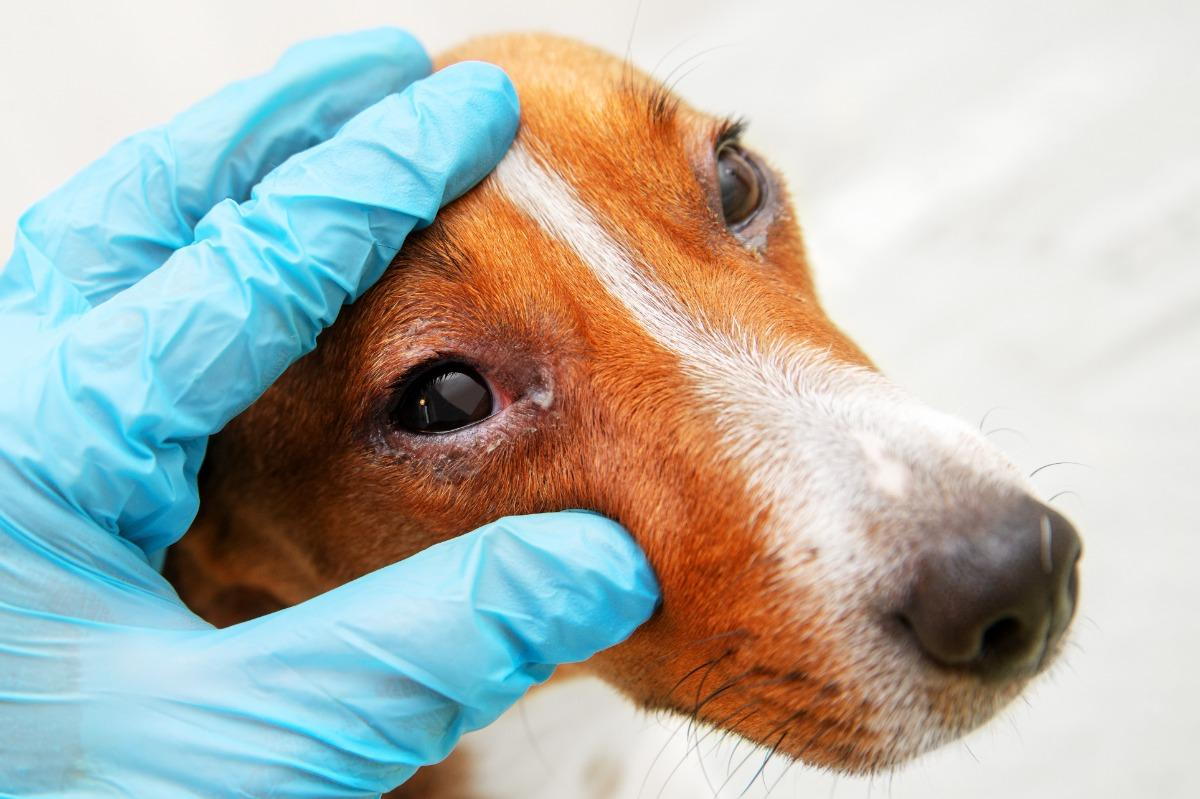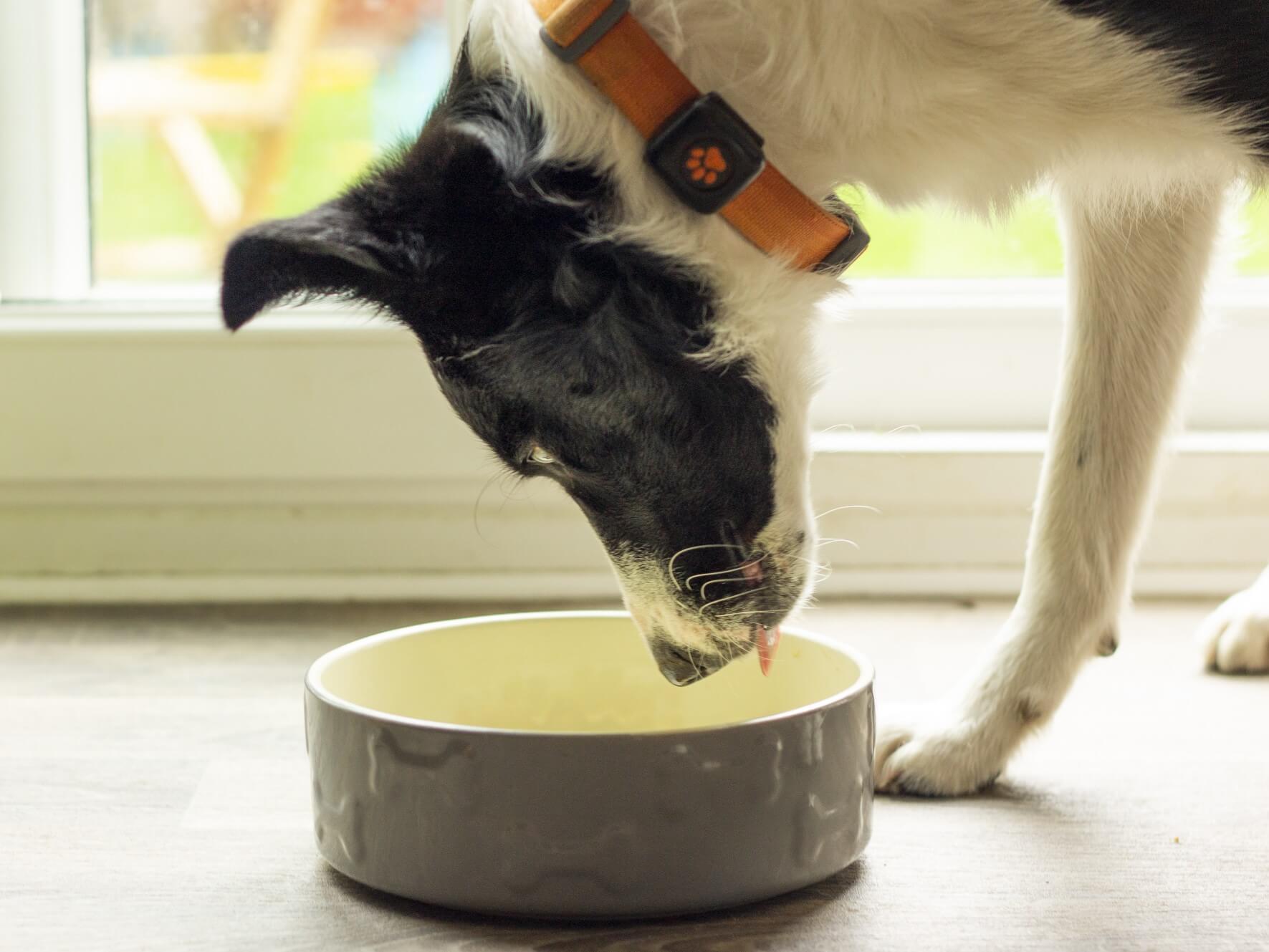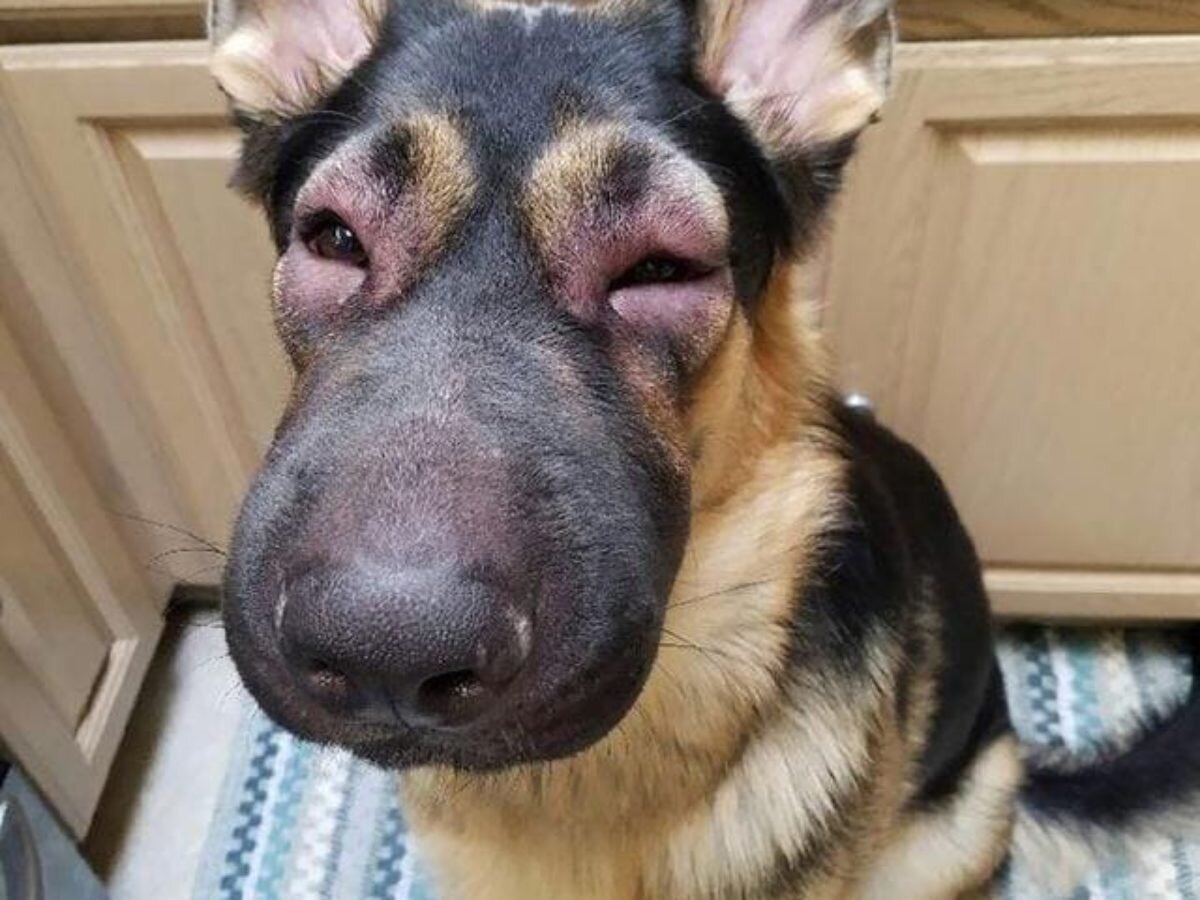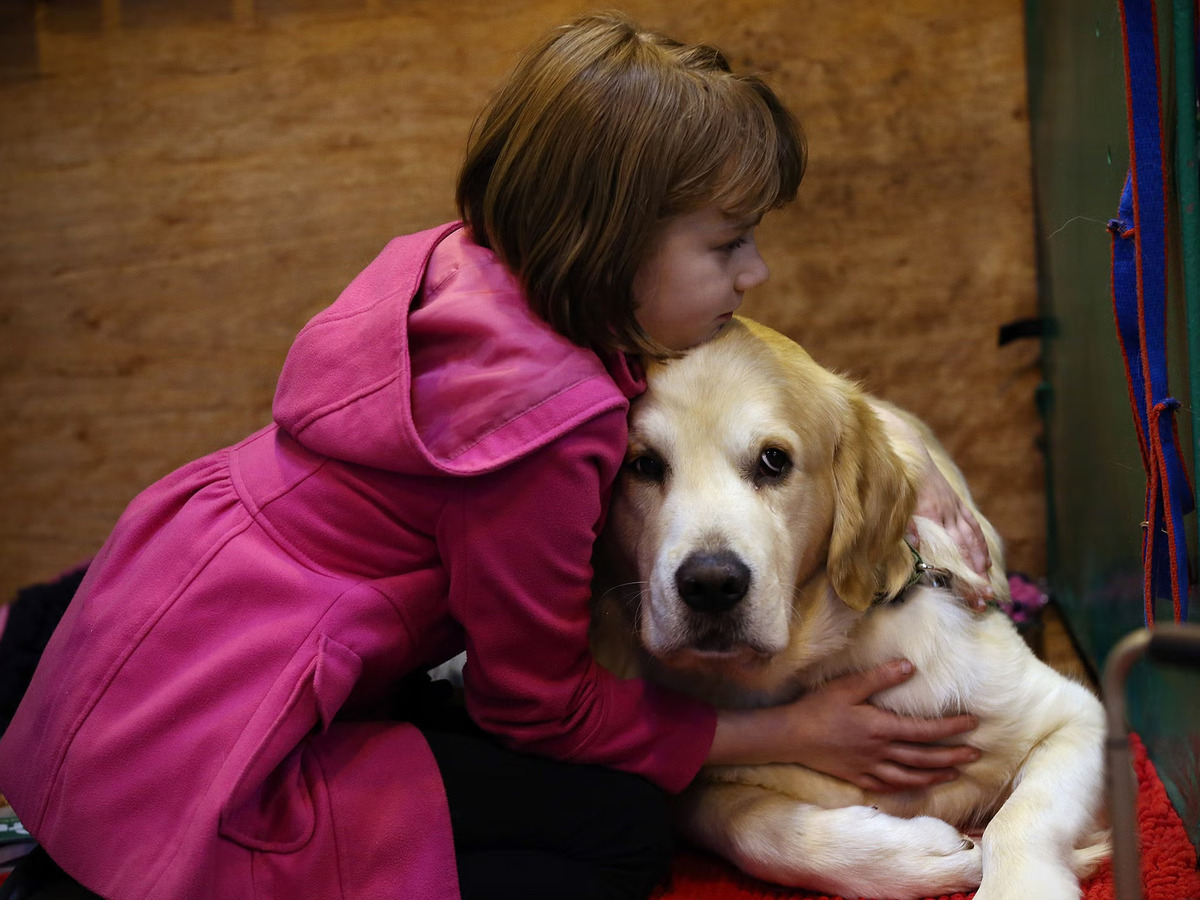Home>Health & Wellness>Common Health Issues>What To Do About A Dog With Wheat Allergies?


Common Health Issues
What To Do About A Dog With Wheat Allergies?
Published: January 26, 2024
Learn how to manage common health issues like wheat allergies in dogs, including symptoms, treatment options, and dietary adjustments. Keep your furry friend healthy and happy!
(Many of the links in this article redirect to a specific reviewed product. Your purchase of these products through affiliate links helps to generate commission for Pawsomeoldies.com, at no extra cost. Learn more)
Table of Contents
Introduction
When it comes to our furry companions, ensuring their health and well-being is a top priority. Just like humans, dogs can also experience a range of health issues, including allergies. One common allergen that affects some dogs is wheat. Wheat allergies in dogs can lead to a variety of uncomfortable symptoms, impacting their quality of life and overall happiness. As responsible pet owners, it's crucial to understand the signs of wheat allergies in dogs and take proactive steps to address and manage this condition.
In this comprehensive guide, we will delve into the world of wheat allergies in dogs, exploring the symptoms, diagnosis, and management of this common health issue. By gaining a deeper understanding of wheat allergies and their impact on our canine companions, we can equip ourselves with the knowledge needed to provide the best possible care for our beloved pets. Let's embark on this journey to discover effective strategies for supporting dogs with wheat allergies, ensuring they can lead vibrant, healthy lives free from the discomfort of allergic reactions.
Read more: What To Do About Cherry Eye In Dogs
Understanding Wheat Allergies in Dogs
Wheat allergies in dogs are a type of adverse reaction to specific proteins found in wheat-based products. When a dog with a wheat allergy ingests or comes into contact with wheat, their immune system identifies the proteins as harmful invaders, triggering an allergic response. This immune system overreaction leads to the release of histamines and other chemicals, resulting in a range of symptoms that can vary in severity.
It's important to note that a wheat allergy is different from a wheat intolerance. While an allergy involves the immune system's response to specific wheat proteins, an intolerance typically stems from difficulties in digesting wheat and does not involve the immune system.
The exact cause of wheat allergies in dogs is not fully understood, but genetics and environmental factors may play a role. Certain breeds may be more predisposed to developing wheat allergies, highlighting the complex interplay between genetic susceptibility and environmental triggers.
When a dog develops a wheat allergy, their immune system recognizes the wheat proteins as foreign and launches an immune response, leading to the production of antibodies and the release of histamines. This cascade of immune activity can manifest in various symptoms, ranging from mild discomfort to more severe reactions.
Understanding the underlying mechanisms of wheat allergies in dogs is essential for pet owners and veterinarians alike. By recognizing the distinct nature of this allergic response, individuals can take proactive steps to minimize their dog's exposure to wheat and seek appropriate medical guidance for effective management.
In the next sections, we will explore the common symptoms of wheat allergies in dogs, the importance of consulting with a veterinarian for accurate diagnosis, and practical strategies for implementing a wheat-free diet to support dogs with this condition. By delving deeper into these aspects, we can gain valuable insights into the holistic management of wheat allergies in dogs, ultimately enhancing the well-being of our canine companions.
Identifying Symptoms of Wheat Allergies in Dogs
Recognizing the symptoms of wheat allergies in dogs is crucial for early intervention and effective management. Dogs with wheat allergies can exhibit a range of physical and behavioral signs, signaling their adverse reaction to this common allergen. By understanding these symptoms, pet owners can promptly seek veterinary care and make informed decisions to alleviate their dog's discomfort.
-
Digestive Distress: Dogs with wheat allergies may experience digestive issues such as diarrhea, vomiting, and excessive flatulence. These symptoms can indicate gastrointestinal inflammation triggered by the consumption of wheat-based products.
-
Skin Irritation: One of the hallmark signs of wheat allergies in dogs is skin irritation. This can manifest as itching, redness, rashes, and hot spots. Dogs may excessively scratch, lick, or chew at affected areas, leading to hair loss and skin lesions.
-
Ear Infections: Wheat allergies can contribute to ear infections in dogs. Pet owners should be vigilant for signs of ear inflammation, including redness, odor, discharge, and increased scratching or head shaking.
-
Respiratory Issues: Some dogs with wheat allergies may experience respiratory symptoms, such as sneezing, coughing, and wheezing. While less common than skin and digestive manifestations, respiratory symptoms should not be overlooked.
-
Behavioral Changes: Allergies can impact a dog's behavior, leading to restlessness, irritability, and decreased activity levels. Observing changes in your dog's demeanor and energy levels can provide valuable clues about their well-being.
-
Chronic Ear and Skin Infections: Dogs with chronic ear and skin infections that do not respond to conventional treatments may be exhibiting symptoms of an underlying wheat allergy. Persistent infections warrant thorough evaluation by a veterinarian.
By remaining attentive to these potential symptoms, pet owners can proactively address their dog's wheat allergies and seek professional guidance for accurate diagnosis and tailored treatment plans. It's important to note that these symptoms can overlap with other health conditions, underscoring the importance of consulting with a veterinarian to confirm the presence of wheat allergies in dogs.
In the subsequent section, we will delve into the pivotal role of consulting with a veterinarian to obtain a definitive diagnosis and develop a comprehensive management strategy for dogs with wheat allergies. This collaborative approach between pet owners and veterinary professionals is essential for ensuring the optimal health and well-being of canine companions affected by wheat allergies.
Consulting with a Veterinarian
Seeking professional guidance from a veterinarian is a crucial step in addressing and managing wheat allergies in dogs. When a dog exhibits symptoms that raise suspicion of a wheat allergy, consulting with a veterinarian is essential for obtaining an accurate diagnosis and developing a tailored treatment plan. Veterinarians possess the expertise and resources to conduct comprehensive evaluations, ruling out other potential health issues and confirming the presence of a wheat allergy.
During the veterinary consultation, pet owners can expect a thorough assessment of their dog's medical history, including any previous allergic reactions or dietary sensitivities. The veterinarian may inquire about the onset and duration of symptoms, as well as any environmental factors that could exacerbate allergic responses. Additionally, a physical examination will be conducted to evaluate the dog's overall health and assess specific symptoms related to wheat allergies, such as skin irritation, digestive distress, or respiratory issues.
In many cases, veterinarians may recommend diagnostic tests to support the identification of wheat allergies in dogs. These tests can include food elimination trials, blood tests to measure allergen-specific antibodies, and skin allergy testing. By leveraging these diagnostic tools, veterinarians can pinpoint the underlying cause of a dog's allergic reactions and tailor their recommendations accordingly.
Upon confirming a wheat allergy diagnosis, veterinarians play a pivotal role in guiding pet owners through the process of implementing a wheat-free diet and managing their dog's allergies effectively. They can provide valuable insights into alternative grain options, specialized hypoallergenic diets, and nutritional supplements to ensure that dogs receive balanced and nourishing meals without exposure to wheat-derived ingredients.
Furthermore, veterinarians can offer recommendations for managing concurrent symptoms, such as skin irritation and gastrointestinal issues, through targeted treatments and lifestyle adjustments. By collaborating closely with veterinarians, pet owners can access the expertise and support needed to navigate the complexities of wheat allergies in dogs, empowering them to make informed decisions for their pet's well-being.
In essence, consulting with a veterinarian is a fundamental step in the holistic management of wheat allergies in dogs. By leveraging the knowledge and guidance of veterinary professionals, pet owners can gain clarity on their dog's condition, implement effective strategies for allergen avoidance, and provide comprehensive care to enhance their furry companion's quality of life.
Implementing a Wheat-Free Diet
Upon receiving a confirmed diagnosis of a wheat allergy in their dog, pet owners play a pivotal role in implementing a wheat-free diet to mitigate allergic reactions and promote overall well-being. Transitioning to a wheat-free diet involves careful consideration of the dog's nutritional needs and the identification of alternative grain options and dietary sources that align with their specific dietary requirements.
The first step in implementing a wheat-free diet is to meticulously review the ingredients of commercial dog food and treats. Many pet food manufacturers offer specialized grain-free or wheat-free formulations tailored to dogs with dietary sensitivities. By selecting high-quality, wheat-free dog food, pet owners can provide their canine companions with balanced nutrition while minimizing the risk of allergic reactions.
In cases where commercial dog food options may not fully align with a dog's dietary needs, pet owners can explore the possibility of preparing homemade meals using vet-approved recipes. This approach allows for precise control over the ingredients, ensuring that the dog's meals are free from wheat and other potential allergens. When crafting homemade meals, it's essential to incorporate alternative grains such as rice, quinoa, and oats to maintain a diverse and nourishing diet for the dog.
Additionally, pet owners should remain vigilant when offering treats and snacks to their dogs, as many conventional treats contain wheat-based ingredients. Opting for wheat-free treats or utilizing natural, single-ingredient snacks such as carrots, blueberries, or lean meats can provide dogs with wholesome rewards without exposing them to wheat allergens.
Furthermore, pet owners should be mindful of potential sources of hidden wheat in their dog's diet, including certain flavorings, thickeners, and additives commonly found in processed pet foods. Reading ingredient labels attentively and seeking guidance from veterinarians can help pet owners navigate the complexities of identifying and avoiding hidden sources of wheat in their dog's diet.
As dogs with wheat allergies may have unique nutritional requirements, incorporating dietary supplements such as omega-3 fatty acids and probiotics can support their overall health and immune function. These supplements can contribute to skin and coat health, digestive balance, and immune system modulation, complementing the efforts to manage wheat allergies effectively.
By thoughtfully implementing a wheat-free diet, pet owners can empower their dogs to thrive without the burden of allergic reactions stemming from wheat consumption. This proactive approach to dietary management aligns with the overarching goal of providing dogs with a nourishing, allergen-free diet that supports their vitality and resilience in the face of wheat allergies.
Alternative Grain Options for Dogs with Wheat Allergies
When transitioning a dog to a wheat-free diet due to wheat allergies, it's essential to explore alternative grain options that not only cater to their dietary needs but also provide essential nutrients for optimal health. Identifying suitable grains that are well-tolerated and nutritionally beneficial can significantly contribute to the successful management of wheat allergies in dogs.
1. Rice:
Rice, particularly brown rice, serves as a valuable alternative grain for dogs with wheat allergies. It is easily digestible and offers a good source of carbohydrates, fiber, and essential nutrients. Brown rice, in particular, provides dogs with energy while supporting digestive health, making it a favorable choice for inclusion in wheat-free diets.
2. Quinoa:
Quinoa is a gluten-free pseudo-cereal that boasts a high protein content and a diverse array of vitamins and minerals. For dogs with wheat allergies, quinoa serves as an excellent alternative grain that contributes to balanced nutrition. Its amino acid profile and fiber content make it a valuable addition to wheat-free diets, promoting overall well-being and digestive regularity.
3. Oats:
Oats are a nutritious grain option for dogs, offering dietary fiber, vitamins, and minerals. When sourced from reputable sources and prepared appropriately, oats can serve as a wholesome addition to wheat-free diets, supporting digestive health and providing sustained energy for canine companions. It's important to select gluten-free oats to ensure compatibility with dogs sensitive to wheat.
4. Millet:
Millet, a gluten-free ancient grain, presents an alternative option for dogs with wheat allergies. It offers a range of essential nutrients, including magnesium, phosphorus, and antioxidants. Millet's light texture and digestibility make it a suitable inclusion in wheat-free diets, contributing to overall nutritional diversity and digestive wellness for dogs.
5. Buckwheat:
Despite its name, buckwheat is not related to wheat and is naturally gluten-free. This nutrient-dense grain provides dogs with essential amino acids, fiber, and minerals. Incorporating buckwheat into wheat-free diets can offer dogs a source of plant-based protein and valuable nutrients, supporting their dietary requirements while minimizing the risk of allergic reactions associated with wheat.
By incorporating these alternative grain options into wheat-free diets, pet owners can ensure that their dogs receive a balanced and varied nutritional intake while avoiding the allergenic effects of wheat. It's important to introduce new grains gradually and monitor the dog's response to each alternative, allowing for a seamless transition to a wheat-free diet that prioritizes their health and well-being.
Monitoring and Managing Allergies in Dogs
Monitoring and managing allergies in dogs, particularly wheat allergies, is an ongoing commitment that requires attentiveness, proactive measures, and collaboration with veterinary professionals. Once a dog has been diagnosed with a wheat allergy, diligent monitoring of their symptoms and the implementation of targeted management strategies are essential for promoting their well-being and minimizing the impact of allergic reactions.
Regular observation of the dog's behavior, physical condition, and any potential signs of allergic responses is a fundamental aspect of monitoring allergies. Pet owners should remain vigilant for any recurrence or exacerbation of symptoms, such as skin irritation, digestive distress, or respiratory issues. By maintaining a keen awareness of the dog's health status, pet owners can promptly identify any changes that may indicate a reaction to wheat or other allergens.
In addition to vigilant observation, managing allergies in dogs involves strict adherence to a wheat-free diet and the avoidance of any potential sources of wheat. This encompasses the careful selection of commercial dog food, treats, and meal ingredients to ensure that they are free from wheat-derived components. Pet owners should also be mindful of cross-contamination risks and hidden sources of wheat in the dog's environment, such as certain household products or outdoor substances.
Collaborating closely with veterinarians is integral to the effective management of allergies in dogs. Regular follow-up appointments and open communication with veterinary professionals allow for ongoing assessment of the dog's response to the wheat-free diet and any prescribed treatments. Veterinarians can provide guidance on potential dietary adjustments, allergy management techniques, and the incorporation of supplementary measures to support the dog's overall health.
Furthermore, managing allergies in dogs involves addressing any secondary symptoms or complications that may arise due to allergic reactions. This may include the treatment of skin infections, gastrointestinal disturbances, or respiratory issues through targeted interventions recommended by veterinarians. By addressing these secondary effects, pet owners can alleviate discomfort and enhance the dog's quality of life.
As part of the management process, pet owners should maintain detailed records of the dog's dietary intake, symptom progression, and responses to specific management strategies. This documentation can offer valuable insights during veterinary consultations and aid in the continuous refinement of the dog's allergy management plan.
By consistently monitoring the dog's condition, adhering to a wheat-free diet, collaborating with veterinary professionals, and addressing secondary symptoms, pet owners can effectively manage allergies in dogs and provide their furry companions with the support needed to thrive despite wheat allergies. This proactive and attentive approach underscores the commitment to promoting the optimal health and well-being of dogs affected by allergies.
Conclusion
In conclusion, navigating the realm of wheat allergies in dogs requires a multifaceted approach that encompasses understanding, proactive management, and unwavering dedication to the well-being of our canine companions. By recognizing the distinct symptoms of wheat allergies, consulting with veterinarians for accurate diagnosis, implementing a wheat-free diet, exploring alternative grain options, and diligently monitoring and managing allergic reactions, pet owners can empower their dogs to lead vibrant, comfortable lives free from the burden of wheat-related discomfort.
The journey of addressing wheat allergies in dogs is a collaborative endeavor that involves the active participation of pet owners and the expertise of veterinary professionals. Through this partnership, pet owners gain valuable insights into the dietary and lifestyle adjustments necessary to support their dogs' unique needs, while veterinarians offer guidance, diagnostic expertise, and tailored treatment recommendations to ensure comprehensive allergy management.
The implementation of a wheat-free diet, enriched with alternative grains and carefully selected nutritional components, serves as a cornerstone in the management of wheat allergies in dogs. By thoughtfully crafting nourishing meals and treats that align with their dogs' dietary requirements, pet owners can provide essential support to mitigate allergic reactions and promote optimal health.
Furthermore, the vigilant monitoring of symptoms and the proactive management of allergies enable pet owners to swiftly identify and address any potential allergic responses, fostering a nurturing environment that prioritizes their dogs' comfort and resilience. This ongoing commitment to attentive care and collaborative management underscores the dedication to enhancing the quality of life for dogs affected by wheat allergies.
As responsible pet owners, it is essential to remain informed, proactive, and compassionate in addressing the unique health needs of our canine companions. By embracing the knowledge and strategies outlined in this guide, pet owners can navigate the complexities of wheat allergies in dogs with confidence, ensuring that their furry friends receive the support and care needed to thrive despite this common allergen.
In essence, the journey of managing wheat allergies in dogs is a testament to the unwavering bond between pet owners and their beloved dogs, reflecting a commitment to providing a nurturing, allergen-free environment that fosters vitality, comfort, and joy for our cherished canine companions.













